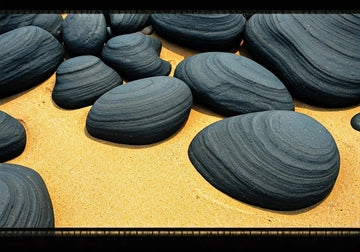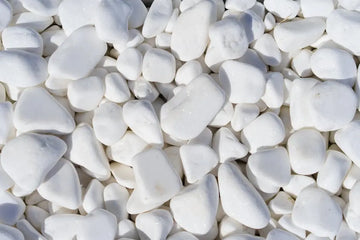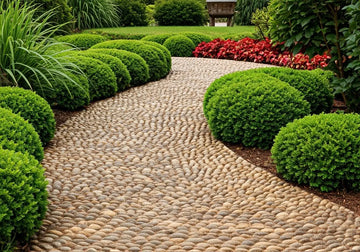9 Essential Considerations When Buying Decorative Pebbles in New Jersey
by Bruno Martins on Aug 24, 2024

When it comes to landscaping or decorating your garden, patio, or indoor spaces, decorative pebbles can be a game-changer. They bring texture, color, and a touch of nature to any setting. However, selecting the right pebbles for your project in New Jersey requires a bit of knowledge and consideration. In this friendly guide, we’ll walk you through nine key factors to keep in mind that will ensure you make the perfect choice for your space.
1. Understanding Different Pebble Types
Diving into the world of decorative pebbles, it’s crucial to start by understanding the myriad of types available. From smooth river rocks to jagged quarry stones, each type offers a unique aesthetic and functional properties. River pebbles, often smoothed over time by running water, bring a natural, tranquil feel ideal for a zen garden or a water feature. Quarry stones, with their rough texture, offer a rugged beauty that can lend an earthy, robust element to your landscaping. It’s all about the vibe you want to create.
In addition to natural stone pebbles, manufactured pebbles present a versatile and often more colorful option. These pebbles can range from polished glass to recycled materials, offering a sustainable choice while still providing that splash of color or textured look you’re seeking. The type of pebble you choose will significantly affect both the aesthetics and maintenance level of your project, making it a pivotal decision in the planning process.
2. The Importance of Pebble Sizing
Size matters more than you might think when it comes to decorative pebbles. The scale of your pebbles should complement the scope of your project. Larger stones can make a bold statement in a spacious garden but could overwhelm a smaller, delicate area. Conversely, small pebbles can introduce a refined texture and detail to tiny spaces but might get lost in a sprawling landscape. Consider the scale of your area and the visual impact you’re aiming for when selecting pebble size.
3. Choosing the Right Color Scheme
Color is not just a matter of preference; it’s a tool to create mood, contrast, and harmony. Whether you’re matching the pebbles with the color palette of your home’s exterior, or aiming for a pop of color in your garden, the options are vast. Natural stone pebbles offer hues that blend seamlessly with outdoor environments, whereas colored glass pebbles can add a vibrant touch to water features or potted plants. Think about the emotions and atmosphere you want to evoke in your space.
4. Local vs. Imported: Sourcing Your Pebbles
When sourcing decorative pebbles, the choice between local and imported options is not just about patriotism or supporting local businesses—it’s about sustainability, costs, and quality. Local pebbles are often more environmentally friendly due to lower transportation emissions and can support local economies. However, imported pebbles might offer unique colors and textures not available locally. Consider your project’s environmental impact, budget, and desired aesthetic to guide your choice.
5. Budgeting for Your Project
Budgeting is inevitably one of the most critical considerations. The cost of decorative pebbles can vary widely based on type, size, color, and source. Setting a realistic budget and sticking to it will help guide your selections, but remember, investing in higher-quality pebbles could save you money in the long run by reducing the need for replacements. Consider all factors and perhaps allocate a bit more budget to this element if it’s central to your design.
6. Calculating the Necessary Quantity
Calculating how much material you need is crucial to avoid under or overestimating, which could lead to unexpected additional costs or project delays. A general rule of thumb is to measure the area’s dimensions where you plan to use the pebbles, then decide on the depth of pebble coverage you desire. Don’t forget to account for a little extra to cover any irregularities in your space or for future touch-ups.
7. Delivery Options and Considerations
Once you’ve selected the perfect pebbles, getting them to your project site is the next step. Depending on the quantity, you might need them delivered. Many suppliers offer delivery services, but fees can vary. Consider accessibility to your property for large trucks if ordering in bulk. It’s also wise to coordinate the delivery timing closely with your project schedule to avoid any disruptions or delays.
8. The Environmental Impact of Your Choice
The environmental impact of using decorative pebbles is an increasingly important consideration. Opting for locally sourced materials can minimize carbon footprints, and recycled pebbles offer a sustainable alternative to natural stone. Also, consider the lifespan and recyclability of the pebbles you choose. Sustainable landscaping not only benefits the environment but can also add value to your property by appealing to green-minded buyers.
9. Maintenance and Longevity
Finally, consider the maintenance requirements and longevity of your chosen pebbles. Natural stone can last many years with minimal care, maintaining its appearance through the seasons. Manufactured materials might require more maintenance or fade over time. Evaluate the time and effort you’re willing to invest in upkeep. Choosing pebbles that suit your lifestyle ensures your landscape remains beautiful and manageable.





